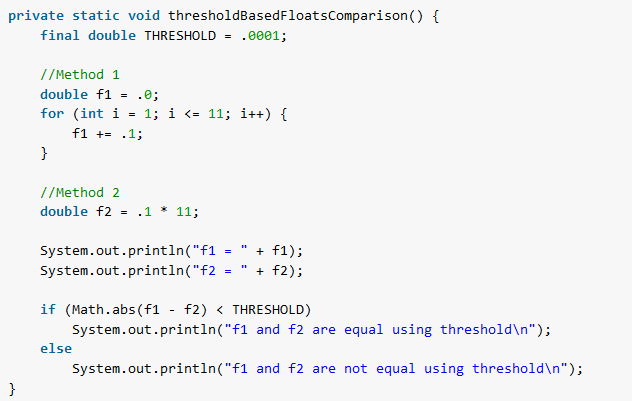Correctly compare float or compare double is not only Java specific problem. It can be observed in almost all the programming languages today. In computer memory, floats and doubles are stored using IEEE 754 standard format. How the actual storage and conversion works, it is out of scope of this article.
For now, just understand that during computations and conversions, minor rounding errors can be introduced in these numbers. That’s why it is not advisable to simply rely on the equality operators (==) to compare floating-point numbers.
Let’s learn how to compare float values in Java.
Table of Contents 1. Simple comparison [Not recommended] 2. Threshold based comparison [Recommended] 3. Compare with BigDecimal [Recommended]
1. Compare double – Simple comparison [Not recommended]
First look at the simple comparison to understand what exactly is wrong with comparing double with == operator. In given program, I am creating same floating point number (i.e. 1.1) using two methods:
- Add
.1, 11 times. - Multiply
.1to 11.
In theory, both operations should produce the number 1.1. And when we compare the results of both methods, it should match.
private static void simpleFloatsComparison()
{
//Method 1
double f1 = .0;
for (int i = 1; i <= 11; i++) {
f1 += .1;
}
//Method 2
double f2 = .1 * 11;
System.out.println("f1 = " + f1);
System.out.println("f2 = " + f2);
if (f1 == f2)
System.out.println("f1 and f2 are equal\n");
else
System.out.println("f1 and f2 are not equal\n");
}
Program Output.
f1 = 1.0999999999999999 f2 = 1.1 f1 and f2 are not equal
Look at the both values printed in console. f1 is computed to 1.0999999999999999. Its exactly the problem which rounding off causes internally. That’s why, floating point comparison with '==' operator is not recommended.
2. Compare double – Threshold based comparison [Recommended]
Now when we know the problem with equality operator, lets solve it. Using programming, we cannot change the way these floating point numbers are stored or computed. So we have to adapt a solution where we agree that a determine the differences in both values which we can tolerate and still consider the numbers equal. This agreed upon difference in values is called the threshold or epsilon.
So now to use ‘threshold based floating point comparison‘, we can use the Math.abs() method to compute a difference between the two numbers and compare the difference to a threshold value.
private static void thresholdBasedFloatsComparison()
{
final double THRESHOLD = .0001;
//Method 1
double f1 = .0;
for (int i = 1; i <= 11; i++) {
f1 += .1;
}
//Method 2
double f2 = .1 * 11;
System.out.println("f1 = " + f1);
System.out.println("f2 = " + f2);
if (Math.abs(f1 - f2) < THRESHOLD)
System.out.println("f1 and f2 are equal using threshold\n");
else
System.out.println("f1 and f2 are not equal using threshold\n");
}
Program Output.
f1 = 1.0999999999999999 f2 = 1.1 f1 and f2 are equal using threshold
3. Compare double – Compare with BigDecimal [Recommended]
In BigDecimal class, you can specify the rounding mode and exact precision which you want to use. Using the exact precision limit, rounding errors are mostly solved.
Best part is that BigDecimal numbers are immutable i.e. if you create a BigDecimal BD with value "1.23", that object will remain "1.23" and can never be changed. This class provide many methods which can be used to do numerical operations on it’s value.
You can use it’s compareTo() method to compare to BigDecimal numbers. It ignore the scale while comparing.
a.compareTo(b);
Method returns:
-1 – if a < b)
0 – if a == b
1 – if a > b
equals() method to compare BigDecimal instances. That is because this equals function will compare the scale. If the scale is different, equals() will return false, even if they are the same number mathematically.Java program to compare double with BigDecimal class.
private static void testBdEquality()
{
BigDecimal a = new BigDecimal("2.00");
BigDecimal b = new BigDecimal("2.0");
System.out.println(a.equals(b)); // false
System.out.println(a.compareTo(b) == 0); // true
}
Now just to verify, let’s solve out original problem using BigDecimal class.
private static void bigDecimalComparison()
{
//Method 1
BigDecimal f1 = new BigDecimal("0.0");
BigDecimal pointOne = new BigDecimal("0.1");
for (int i = 1; i <= 11; i++) {
f1 = f1.add(pointOne);
}
//Method 2
BigDecimal f2 = new BigDecimal("0.1");
BigDecimal eleven = new BigDecimal("11");
f2 = f2.multiply(eleven);
System.out.println("f1 = " + f1);
System.out.println("f2 = " + f2);
if (f1.compareTo(f2) == 0)
System.out.println("f1 and f2 are equal using BigDecimal\n");
else
System.out.println("f1 and f2 are not equal using BigDecimal\n");
}
Program Output.
f1 = 1.1 f2 = 1.1 f1 and f2 are equal using BigDecimal
That’s all about comparing floating point numbers in java. Share your thoughts in comments section.
Happy Learning !!


Comments